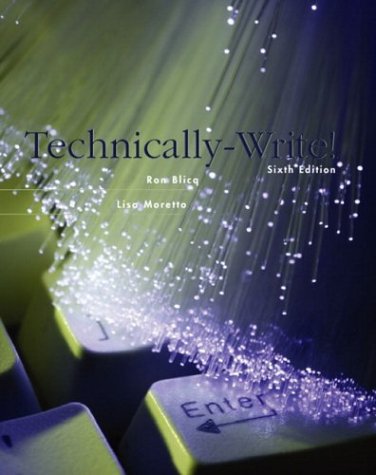

Most ebook files are in PDF format, so you can easily read them using various software such as Foxit Reader or directly on the Google Chrome browser.
Some ebook files are released by publishers in other formats such as .awz, .mobi, .epub, .fb2, etc. You may need to install specific software to read these formats on mobile/PC, such as Calibre.
Please read the tutorial at this link. https://ebooknice.com/page/post?id=faq
We offer FREE conversion to the popular formats you request; however, this may take some time. Therefore, right after payment, please email us, and we will try to provide the service as quickly as possible.
For some exceptional file formats or broken links (if any), please refrain from opening any disputes. Instead, email us first, and we will try to assist within a maximum of 6 hours.
EbookNice Team

Status:
Available0.0
0 reviews
ISBN-10 : 0131148788
ISBN-13 : 9780131148789
Author: Ronald S. Blicq, Lisa Moretto
This complete, “on-the-job” exploration of both written and oral communication concentrates on the most effective techniques for the types of communications most frequently encountered in today's business world. This new edition updates coverage to accurately reflect the techniques used to write today's professional correspondence and reports. The book uses the example of two employees involved in two technically-oriented companies, the type of work they perform, and some typical situations that call for them to communicate with clients, suppliers, and each other, to drive home the concepts presented. Topics include: letters, memos, and e-mail; short, informal reports; larger informal and semiformal reports; formal reports; technical proposals; communicating with prospective employers; and technical writing. For any employee whose responsibilities include preparing reports and documents; also for those where speaking at meetings and seminars is a necessary part of their jobs. This book can serve as an excellent reference for job-hunters.
1. Why Technical People Need to Write Well.
2. A Technical Person's Approach to Writing.
3. Letters, Memos and Email.
4. Short Informal Reports.
5. Longer Informal and Semiformal Reports.
6. Formal Reports.
7. Technical Proposals.
8. Other Technical Documents.
9. Illustrating Technical Documents.
10. Technically-Speak!
11. Communicating With Prospective Employers.
12. The Technique of Technical Writing.
technically definition
technically meaning
what is technically a fever
floral stalk is technically termed as
who is technically the best guitarist ever
Tags: Technically Write, Ronald Blicq, Lisa Moretto, oral communication